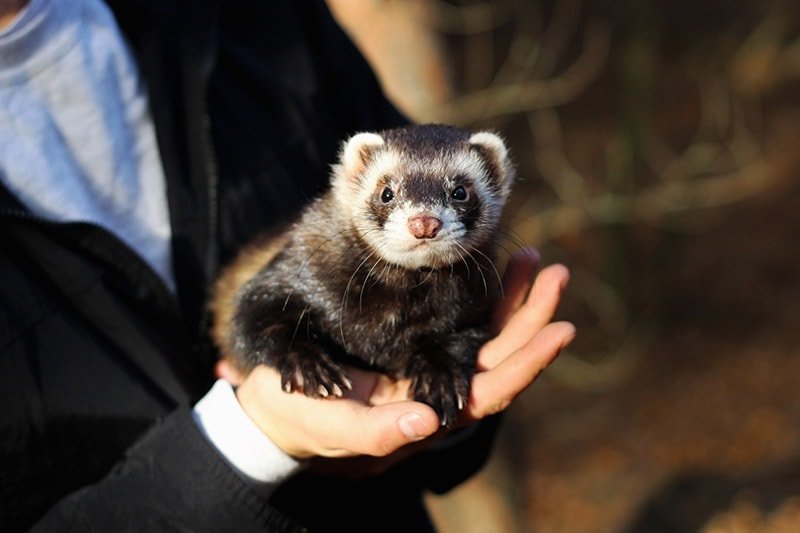
Imagine your black sable ferret as a little furry ninja. They are curious, agile, and love to explore. But just like any adventurer, they need the right tools and care to thrive in their environment. If you’re thinking about bringing one of these adorable critters into your life, let’s dive into the essentials of caring for a black sable ferret.
Understanding Your Black Sable Ferret’s Diet
One of the most important aspects of ferret care is their diet. A well-balanced diet is crucial for keeping your black sable ferret healthy and happy. Ferrets are obligate carnivores, which means their bodies are designed to thrive on a diet primarily rich in animal protein. Think of them as tiny little meat-loving machines!
So, what should you feed your ferret? Look for high-quality ferret food that lists meat as the first ingredient. Ingredients like chicken, turkey, or lamb are great options. You might also consider offering them small amounts of raw or cooked meat, such as chicken or beef, along with some whole prey items like quail or mice.
Things to Avoid:
– Grains: Stay away from foods that contain corn, wheat, or soy. Ferrets’ digestive systems can have trouble with these.
– Fruits and Vegetables: While some pets enjoy a snack of veggies, ferrets don’t digest these well.
– Sugary Treats: These can lead to obesity and other health issues.
A Sample Feeding Schedule
Ferrets generally do best with multiple small meals throughout the day since they’re natural hunters. You might try feeding your ferret:
- Morning: A small serving of ferret kibble
- Afternoon: A few pieces of raw meat or a whole prey item
- Evening: Another serving of high-quality ferret food
You’ll find that routine helps them feel secure. Plus, it’s fun watching them enjoy meal time!
Creating a Cozy Home for Your Ferret
Next up, let’s talk about home sweet home for your black sable ferret. Just like you wouldn’t want to live in a messy room, your ferret deserves a clean, cozy space to call home. The ideal setup includes a spacious cage, play areas, and safe toys.
Choosing the Right Cage
When selecting a cage, look for one that’s spacious enough for your ferret to move around. A multi-level cage is a great choice, as it gives them room to explore and climb. Aim for a cage that’s at least 2 feet high and 3 feet long.
Inside the cage, include:
- A hammock or soft bedding for snuggling
- Hiding spots, like small boxes, to satisfy their curiosity
- Water bottles or bowls for hydration
You might want to rotate toys regularly to keep things exciting. Ferrets love to chew and dig, so provide them with safe chew toys and tunnels to explore.
Health Basics for Your Black Sable Ferret
Keeping an eye on your ferret’s health is super important. Regular vet check-ups can catch any sneaky health issues early on. Ferrets are prone to certain conditions, so knowing what to look for can help.
Common Health Issues
– Adrenal Disease: A condition that affects hormone production. Watch for symptoms like hair loss or increased aggression.
– Insulinoma: A tumor on the pancreas. Common signs include weight loss and lethargy.
It’s generally recommended to take your ferret to the vet at least once a year for a routine check-up. This way, they can stay on top of vaccinations and get a clean bill of health.
Signs Your Ferret Needs a Vet Visit
Be on the lookout for:
- Change in eating habits
- Unusual lethargy or hiding
- Constant scratching or hair loss
If you notice any of these signs, it’s best to consult your vet right away.
Grooming Your Black Sable Ferret
While ferrets are naturally good at keeping themselves clean, they still need a little help from you now and then. Grooming helps keep their fur nice, reduces odor, and allows you to check for any skin issues or parasites.
Brushing
Using a soft brush can help remove loose fur and dirt from your ferret’s coat. Aim to brush them at least once a week. This becomes a great bonding time for both of you!
Nail Trimming
Regular nail trims are essential, too. You want to avoid those sharp little claws from scratching you or causing injury to your furniture.
Bathing
Ferrets don’t need frequent baths, but if they start to smell a bit funky, a bath every few months could help. Use a gentle shampoo made specifically for ferrets.
Playtime and Social Needs
Black sable ferrets are social creatures. They thrive on interaction—both with you and other ferrets. Make sure to set aside time each day for play.
Fun Activities for Your Ferret
– Tunnels and Obstacle Courses: Create challenges that encourage exercise and exploration.
– Interactive Toys: Toys like balls or puzzle feeders can keep them entertained.
Consider having a second ferret as a companion. They can keep each other company and play, which can be a big help when you’re busy.
Bonding with Your Ferret
Bonding with your ferret is vital. Spend time holding them, letting them explore your lap, or even taking them for supervised walks in a safe area. The more time you invest in your relationship, the more affectionate they’ll become.
Wrapping Up Your Ferret Care Journey
Caring for a black sable ferret is a rewarding adventure filled with cuddles, play, and lots of love. By providing a well-rounded diet, a cozy and safe home, and regular health checks, you’re setting up your little furry friend for a happy life.
Remember, every ferret is unique, so pay attention to their specific needs and personality. And most importantly, enjoy the journey! After all, these little furballs are here to brighten your life, one playful leap at a time.

